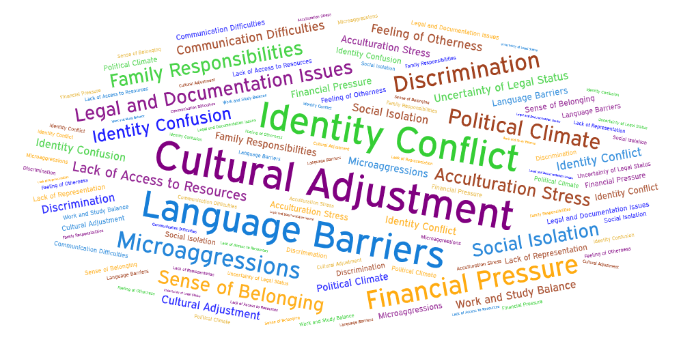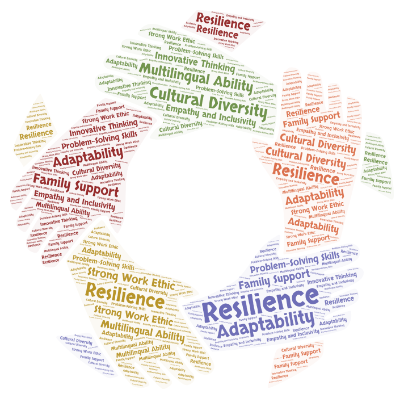Immigrant Students
I mmigrant students often face unique stressors, such as fitting into a culture different from their own, experiencing communication barriers, facing discrimination due to their marginalized identities, and dealing with legal uncertainty and financial pressures, which can significantly impact their well-being and ability to thrive in college life. These stresses, coupled with high academic demands, expectations, and limited support, can lead to negative health and mental health outcomes. Few immigrant students tend to seek professional support due to factors such as financial constraints, lack of knowledge about available resources, and cultural stigma around mental health issues. Despite these challenges, immigrant students exhibit remarkable strengths such as resilience, adaptability, and a strong work ethic. Their determination to overcome obstacles and succeed academically, combined with support from family and community, often helps them navigate and thrive in their college experiences.
mmigrant students often face unique stressors, such as fitting into a culture different from their own, experiencing communication barriers, facing discrimination due to their marginalized identities, and dealing with legal uncertainty and financial pressures, which can significantly impact their well-being and ability to thrive in college life. These stresses, coupled with high academic demands, expectations, and limited support, can lead to negative health and mental health outcomes. Few immigrant students tend to seek professional support due to factors such as financial constraints, lack of knowledge about available resources, and cultural stigma around mental health issues. Despite these challenges, immigrant students exhibit remarkable strengths such as resilience, adaptability, and a strong work ethic. Their determination to overcome obstacles and succeed academically, combined with support from family and community, often helps them navigate and thrive in their college experiences.
UCS is prepared to provide mental health services to immigrant students at VCU, and connect them with helpful resources both on campus and in the community to support their growth and well-being. Read the following to better understand and support yourself or immigrant students you know.
Unique Stressors

Cultural Adjustment and Identity Conflict
- Acculturation Stress: Challenges in balancing the cultural norms and expectations of one’s country of origin with those of the host country (e.g., U.S.).
- Identity Confusion: Struggles of reconciling multiple identities and experiencing pressure to fit into both cultures.
Language Barriers
- Communication Difficulties: Challenges in engaging in and completing academic work, and navigating complex college systems to get support, in a non-native language.
- Social Isolation: Difficulty in forming relationships with peers due to language differences.
Legal and Documentation Issues
- Uncertainty of Legal Status: Fear and anxiety related to one’s immigration status, particularly for undocumented students or those with DACA.
- Lack of Access to Resources: Ineligibility for certain financial aid, scholarships, and campus services due to legal status.
Financial Pressure
- Limited Financial Resources: Many immigrant students come from low-income families but have limited access to financial aid and scholarships.
- Work and Study Balance: Balancing multiple jobs to support oneself and their families while maintaining academic performance.
Family Responsibilities
- Family Expectations: Pressure to succeed academically and financially support family members.
- Separation from Family: Emotional strain from being separated from family members, especially those still in their country of origin.
Discrimination and Microaggressions
- Discrimination: Experiencing prejudice and discrimination based on one’s marginalized identities, such as race, ethnicity, or immigration status.
- Microaggressions: Experiencing frequent subtle, often unintentional, discriminatory comments or behaviors that can accumulate and affect mental health.
Sense of Belonging
- Feeling of Otherness: Struggling to feel accepted and included within the campus community.
- Lack of Representation: Absence of role models and mentors from similar backgrounds.
Political Climate
- Anti-Immigrant Sentiment: Negative rhetoric and policies towards immigrants can create a hostile environment.
- Policy Changes: Anxiety about changes in immigration policies from both the home and host countries that could affect one’s ability to stay in the U.S.
Negative Mental Health Outcomes
These stresses can lead to various mental health issues that often include but not limited to:
- Anxiety and Depressive Mood: Persistent worry about academic, legal, financial, and family challenges.

- Difficulty adjusting: Difficulty adapting to the new cultural and academic environment.
- Post-Traumatic Stress: For those who have experienced trauma in their home country or during their journey to the U.S.
- Social Withdrawal: Isolating themselves due to feeling overwhelmed or misunderstood.
- Burnout: Physical and emotional exhaustion from trying to balance multiple high-pressure roles.
Barriers for Seeking Support
Immigrant college students often encounter several barriers to seeking mental health services. One significant barrier is cultural stigma surrounding mental health issues, where seeking help might be viewed as a sign of weakness or failure. This can prevent students from acknowledging their mental health needs and pursuing professional support.
Additionally, language barriers can make it difficult for students to communicate their issues effectively and understand available resources.
Financial constraints are another major obstacle, as many immigrant students may lack health insurance or sufficient funds to cover the cost of mental health services.
Furthermore, lack of knowledge about the mental health system and available resources can deter students from seeking help. Immigrant students may also face fear of discrimination or bias from healthcare providers, which can result in mistrust and reluctance to engage with mental health services.
The combination of these barriers often leads to underutilization of mental health services among immigrant college students, despite their significant need for support.
Strengths of Immigrant Students
 Immigrant students bring a wealth of strengths to their educational institutes like VCU, including multilingual abilities, cultural diversity, and a global perspective. Their resilience and adaptability, forged through navigating new environments and overcoming challenges, foster strong problem-solving skills and a robust work ethic. With a deep appreciation for educational opportunities and strong family support, these students often demonstrate high motivation and academic dedication. Additionally, their experiences cultivate empathy, inclusivity, and innovative thinking, enriching the classroom environment for all students. Through their unique contributions, immigrant students enhance the diversity and dynamism of VCU.
Immigrant students bring a wealth of strengths to their educational institutes like VCU, including multilingual abilities, cultural diversity, and a global perspective. Their resilience and adaptability, forged through navigating new environments and overcoming challenges, foster strong problem-solving skills and a robust work ethic. With a deep appreciation for educational opportunities and strong family support, these students often demonstrate high motivation and academic dedication. Additionally, their experiences cultivate empathy, inclusivity, and innovative thinking, enriching the classroom environment for all students. Through their unique contributions, immigrant students enhance the diversity and dynamism of VCU.
- Multilingual Abilities: Many immigrant students are fluent in multiple languages. This enhances their cognitive flexibility and communication skills. Studies have shown that bilingualism enhances cognitive abilities and executive functioning skills.
- Cultural Diversity and Global Awareness: Diverse classrooms have been found to promote better problem-solving and critical thinking skills. Immigrant students contribute diverse perspectives and cultural backgrounds to the classroom, enriching the learning environment for all students. Also, they frequently have a broader understanding of global issues and different cultures, which can enhance their peers' awareness and empathy.
- Resilience and Adaptability: The challenges of adapting to a new country and educational system often foster resilience, determination, and adaptability in immigrant students.
- Strong Work Ethic: Numerous immigrant students have a strong motivation to succeed academically and make the most of educational opportunities, often driven by the desire to improve their circumstances and honor their families' sacrifices.
- Family Support: Research highlights the high value placed on education by immigrant families and its impact on students' academic success.
- Problem-Solving Skills and Innovative Thinking: Diverse views from immigrant students in classrooms contribute to innovative problem-solving and creativity. Navigating new environments and overcoming language barriers can enhance immigrant students’ problem-solving abilities and resourcefulness.
- Empathy and Inclusivity: Experiences of being an immigrant can foster greater empathy and inclusivity, and therefore, can promote a more supportive and welcoming college community.
Resources
On-Campus
- VCU University Counseling Services: Available Services to Students
- VCU Admissions: DACA & undocumented Students
- Division of Student Affairs: Deferred Action for Childhood Arrivals
- Office of Student Advocacy:
- Respond to general questions and offering pertinent information: make an appointment through How to Get Assistance
- Assist students with navigating university processes
- Direct students to suitable campus resources: Check out available on-campus Resources, or Student Resource Guide
- Explain policies that may affect students
- Manage grievances and complaints
- Global Education Office
- The Office of Multicultural Student Affairs (OMSA)
- Campus Learning Center
- VCU Career Services
- VCU Student Organizations: Search on RAMS Connect and join cultural, spiritual, academic, and hobby-based student organizations to find your own community!
- Victor Humberto Narro Scholarship
- Ram Pantry
Off-Campus
References
- Cadenas, G. A., Nienhusser, K., Sosa, R., & Moreno, O. (2022). Immigrant students’ mental health and intent to persist in college: The role of undocufriendly campus climate. Cultural Diversity and Ethnic Minority Psychology.
- Dombou, C., Omonaiye, O., Fraser, S., Cénat, J. M., Fournier, K., & Yaya, S. (2023). Barriers and facilitators associated with the use of mental health services among immigrant students in high-income countries: A systematic scoping review. PloS one, 18(6), e0287162.
- Leong, F. T., & Kalibatseva, Z. (2011). Cross-cultural barriers to mental health services in the United States. In Cerebrum: the Dana forum on brain science (Vol. 2011). Dana Foundation.
- Moreno, O., Sosa, R., Hernandez, C., Nienhusser, H. K., & Cadenas, G. (2022). Immigration status, mental health, and intent to persist among immigrant college students. Journal of Diversity in Higher Education.
- Nienhusser, H. K., & Romandia, O. (2022). Undocumented college students’ psychosocial well-being: A systematic review. Current opinion in psychology, 47, 101412.
- Schwartz, S. J., Waterman, A. S., Umaña‐Taylor, A. J., Lee, R. M., Kim, S. Y., Vazsonyi, A. T., ... & Williams, M. K. (2013). Acculturation and well‐being among college students from immigrant families. Journal of clinical psychology, 69(4), 298-318.